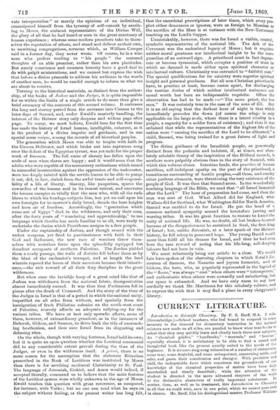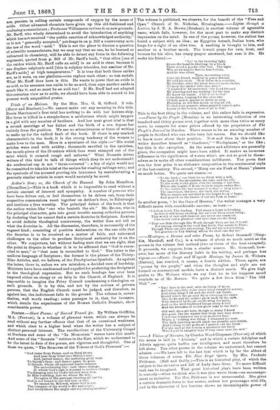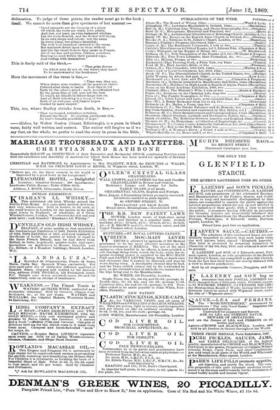CURRENT LITERATURE. .
Introduction to Scientific Chemistry. By F. S. Barff, 31.A. 2 vols. (Groombridge.)—School teachers, who feel bound to respond in some measure to the demand for elementary instruction in the natural sciences now made on all sides, aro puzzled to know what text-books to select that they may quickly learn and clearly teach these new subjects. As " chemical guides," " handbooks," " manuals," and " lessons" especially abound, it is satisfactory to be able to find a sound and thoughtful book liko the present exactly suited to the needs of the beginner. It is no users sing-song reiteration of a number of statements, some true, some doubtful, and some unimportant, concerning acids, and salts, and gases, their constitution and changes. With precision and skill, the indisputable facts which constitute the groundwork of our knowledge of the chemical properties of matter have been duly marshalled and clearly described ; while the attention of the student is directed in the more advanced chapters of the work to tho distinctive characters of really important substances. In matter, then, as well as in treatment, this Introduction to Chemistry is all that we could wish, save in one point, which we cannot pass over in silence. Mr. Barff, like his distinguished master, Professor William son, persists in calling certain compounds of oxygen by the name of acids. Other advanced chemists have given up this old-fashioned and confusing nomenclature ; Professor Williamson revives it on new grounds. Mr. Barff, who wisely determined to avoid the introduction of anything which has not received "the public sanction of acknowledged authority," or is not " generally accepted," yet drags in on p. 262 a controversy as to the use of the word "acid." This is not the place to discuss a question of scientific nomenclature, but we may say that no one, be he learned or unlearned in chemistry, will be able to detect any force in the following argument, quoted from p. 262 of Mr. Barff's book, " that silica [ono of the oxides which Mr. Barff calls an acid] is an acid is clear, because it
• can displace sulphuric acid [this is sulphur trioxides, but another of Mr. Barff's acids] at high temperatures." It is true that both these oxides are, as it were, on one platform—can replace each other ; so can metals. What Mr. Barff does here is this. He wants to prove that an oxide is an acid, so he assumes one oxide to be an acid, then says another oxide is much like it, and so must be an acid too! If Mr. Barff had not adopted this sectarian view as to acids, we should have been able to accord to his present work unqualified praise.
Trials of an Heiress. By the Hon. Mrs. G. R. Gifford. 3 vole. (Hurst and Blackett.)—Wo cannot make out any moaning in this title. Bessie Marchmont's first trial has nothing to do with her heiress-ship. Her lover is killed in a steeplechase, a misfortune which might happen to a girl with any number of brothers. And her next great trial is that a second marriage of her father and the birth of a son depose her entirely from the position. We see no attractiveness or force of writing to make up for the radical fault of the book. If there is any marked characteristic in the book, it is the strong tendency of the women to make love to the men. Here is a specimen of the style :—" His social articles were read with avidity; thousands revelled in the cynicism, the month-piece of the ill-nature which thus went stamped out of the mint which it entered rough and unhewn." What Nemesis drives writers of this kind to talk of things which they do not understand ? An academical cap is not " three-cornered " ; a boy of eight would not be committed to take his trial at the assizes for stealing cabbage-nets ; and the spectacle of the accused proving his innocence by manufacturing a precisely similar article in court would certainly be novel.
Arthur's Seat; or, the Church of the Banned. By John Hamilton. (Macmillan.)—This is a book which it is impossible to read without a certain amount of interest and sympathy. A. number of persons who have been driven out, or feel themselves to be driven out, from their respective communions meet together on Arthur's Seat, in Edinburgh, and institute a free worship. The principal defect of the book is that the author writes like "ono who beateth the air." Mr. Brown, who is the principal character, gets into great trouble among orthodox persons by declaring that he cannot find a certain doctrine in Scripture. Anxious to avoid definite theological controversy, the writer does not tell us what the doctrine is. All the discussion, therefore, is necessarily of the vaguest kind ; consisting of positive declarations on the one side that the doctrine is to be received as a matter of faith, and reiterated challenges on the other to produce Scriptural authority for it on tho other. We conjecture, but without feeling sure that we are right, that the point in dispute is whether it is to be affirmed that "God is reconciled to man," or "that man is reconciled to God." The latter is the uniform language of Scripture ; the former is the phrase of the ThirtyNine Articles, and, wo believe, of the Presbyterian Symbols. As against the latter, there is, unless we are mistaken, a decided case of hardship. Ministers have been condemned and expelled for preferring the Scriptural to the theological expression. But no such bondage has over been imposed either on clergy or on laity in the Church of England. It is impossible to imagine the Privy Council condemning a theologian on such grounds. It is by this, and not by the notions of private persons, that the English Church must be judged, and therefore, as against her, the indictment falls to the ground. The volume is, nevertheless, well worth reading; some passages in it, that, for instance, which details the experiences of the Roman Catholic Dominic, show considerable power.
Potwar_—Short Poems: of Sacred Travel, 4-c. By William Griffiths, M.A. (Provost), is a volume of pleasant verse, which can always bo read without any further offence that that of an occasional weakness, and which rises to a higher level when the writer has a subject of distinct personal interest. The recollections of the University Chapel at Durham and some of the "In Memoriam " verses have this merit. And some of the "Sonnets " written in the East, which we understand to be the latest in date of the poems, are vigorous and thoughtful. One of these we quote, "The Removes of the Tokens of God's Presence":—
"God came from Paran, and on Sinai shone.
And past from Sinai into Shiloh's tent; And, parted thence, the unreeling glory went To Salem's lane; and thence again 'tie gone. 0 friends, whose oft-uprooted hearts bemoan The uncontinuing city! sure 'twere strange, If, where God's sign is doomed to restless change,
Unchanging rest for God's beloved were won.
In Him confiding, fare we where He will ; Thoughts of His partings cheering all our lot, God is not bound to one fair tent or bill; Ye cannot be, Beloved, where God 13 not. The compass of the world is His and yours; And everywhere His might safe sojourning secures."
The volume is published, we observe, for the benefit of the "Free and Open " Church of St. Nicholas, Birmingham.—Lights through a Lattice, by J. E. A. Brown (Strahan), is another volume of agreeable verse, which fails, however, for the most part to make any distinct impression on the mind. In one of the poems, however, the author has found a subject with an idea; an Egyptian hermit, Italian born, who longs for a sight of an olive tree. A seedling is brought to him, and another to a brother monk. The hermit prays for rain, frost, and breezes for his olive, has every prayor answered, but sees it die. Ho seeks his friend :—
"1.0! in the morning light, Above the humble dwelling, by a brook There stood a goodly olive tree. The eight Was as an angel's face to him forlorn, And he was silent. Then, recovering voles, Unto his friend, walking in peace abroad, He told his story. 'How did'at thou contrive, My brother, ethic° thy plant was not more choice, To keep the tender olive true
• I planted it,' he answered, • the Lord blessed My planting and my tending; for the rest Ile knew its wants. I left it all to God." 0 brethren, longing for the olive tree Of holy peace. maybe yo strive In vain, Planning, as ilia this monk, in legend To find your prayers, when granted, turn to pale. Learn ye his lesson, leave it all to God."
This is the best thing in the volume, and this rather fails in expression. —Poems by the People (Menzies) is an interesting collection of one hundred and thirty poems sent, together with more than twice as many more, to compote for some prizes offered by the proprietors of The People's Journal in Dundee. There seems to be an amazing number of people in Scotland who can write very fair verses. But wo should like to know more about their position. Now and then in this volume a writer describes himself as " Gardener," " Woolspinner," or the like ; but this is tho exception. As the names and addresses are generally given, the occupation might have boon added. It makes an immense difference in the significance of verses whic!i are not so good in themselves as to make all other considerations indifferent. The poem that won the first prize is an elaborate composition in the sentimental style of the last century. The second, "'Mang our ain Fouk at Hanle," pleases us much bettor. We quote one stanza :— " To the land o' our birth lot US drink with a will. Tho laud of the mountains, the lake, and the rill; To the steep rocky glens, e'en the haunts o' the free, Whore the eagles of Rome In their might audits flee; To the bairns she has nurtured in days o' lang syuuThe statesman, the hero, the bard, the divine, Wheat, names are enrolled In the bright hook o' fame, And graved on the hearts of our ale Fouk at hamo."
In another poem, " At the Gate of Heaven," the writer manages a very difficult metre with considerable success ; as here :— "I follow Lord, Thy leading. Full many a heart Is bleeding, In this world many needing, the succour Thou can't bring ; This world of care and clamour van never me enamour, Can never cast a glamour over eyes that nee the King.
"That see Him through His Word, though Thou art far, 0 Lord! Yet strong, strong ie the cord that binds Thy mantel to Thee ; Though Thou our eyes art sealing, Thyself art not revealing, Yet gracious is Thy dealing, whom we ellen one day see."
Montague, a Drama and other Poems, by Robert Gemmel' (Simpkin, Marshall, and Co.), is a volume of about as much merit as the poems in the volume last noticed (two or three of the best excepted). It proceeds, we suppose, from a similar source. Mr. Gemmel', however, has more of the literary habit in his writing, and perhaps loss vigour.--Rustic Songs and Wayside Musings, by James R. Withers (Dorton), has reached, it seems, a fourth edition. Those, again, are "poems by the people," and when the thoughts and style are not formed on conventional models, have a distinct merit. We give high praise to Mr. Withers when we say that he in his happiest mood reminds us of Mr. Barnes. Wo quote a few limn from " The Old Well "
"Yes! hero Is the well, with Its lining of moss, And the smoothly worn crane lying straightly across ; And rusty-hinged lid, and the solid oak frame, Bound which the ground ivy is creeping the same. Tho docks and the nettles grow rank by the rails, Well watered by floods overflowing the palls ; And on tho wild bindweed hangs many a bell, And the sweetest of violets grow near to the well!
Old well, thou art here. though so many I knew Are gone, like the waters that from thee they draw— 1 still can remember my poor mother's fear, When, a ' tattling wee thing,' I ventured too near. Thy dark yawning mouth made me tremble and shrink, And I clung to her gown as I peered o'er the brink! For she said at the bottom a mermaid did dwell Who'd pull in naughty boys If they came near the well."
—A Vision of Socrates, by Charles Wood Chapman (Provost), of which the scene is laid in " Athonia," and in which a certain Adolphus and Adoria appear, quite baffles our intelligence, and must therefore be loft alone. The other poems in the volume we understand, but cannot admire. —We bavo left to the last that which is by far the ablest of these volumes of verse, The Nine Days' queen. By Mrs. Frederic Prideaux. (Bell and Daddy.)—This is an historical play, of which the subject is the elevation and fall of Lady Jane Grey. No more difficult task can be imagined. That great historical plays have been written is scarcely—when we think who it was that wrote them—an encouragement to imitation. Yet Mrs. Pridoaux is not unsuccessful. She gives a certain dramatic force to her scenes, endues her personages with life, and in the character of her heroine shows no inconsiderable power of delineation. To judge of these points, the reader must go to the book itself. We cannot do more than give specimens of her manner: "Good manners are the blossom of a plant Of which the roots are truth, love, purity, And last, not least, an even-balanced wisdom. Let the roots flourish, and the flower will bloom In its own shape and colour; not the same In every plant, but always beautiful; The very soul breathed outward to the sense. But manners thrust upon us from without Are like the tinsel flowers they make in France, All of one hue and pattern, lifeless, scentless, Bearing no seed within their painted cups, And ending with themselves."
This is finely said of the block,
" That grim throne On which men do not sit, but where they kneel To be uncrowned of the headsman."
Here the movement of the verse is fine, "Time was, they Bay, When dukes were leaders, all the populous shires Pressed after them to battle. Now they're led Each by the other's greed : each, hoodwinked fast By the gross film of self, sees not the rain
To which his blindfold fellow drags him on. And all their following is a troop of fears Born of an evil past, and frantic hopes Guided by mere despair."
This, too, where Dudley shrinks from death, is fine,
" That icy-fanged, relentless certainty,
Freezes the blood. No stirring, passionate risk, No hair's-breadth possibility of hope."
-Gideon, by Walter Goalon (Grant, Edinburgh), is a poem in blank verse, fairly well written and correct. The author will forgive us if we say that, on the whole, we prefer to read the story in prose in the Bible.
































 Previous page
Previous page